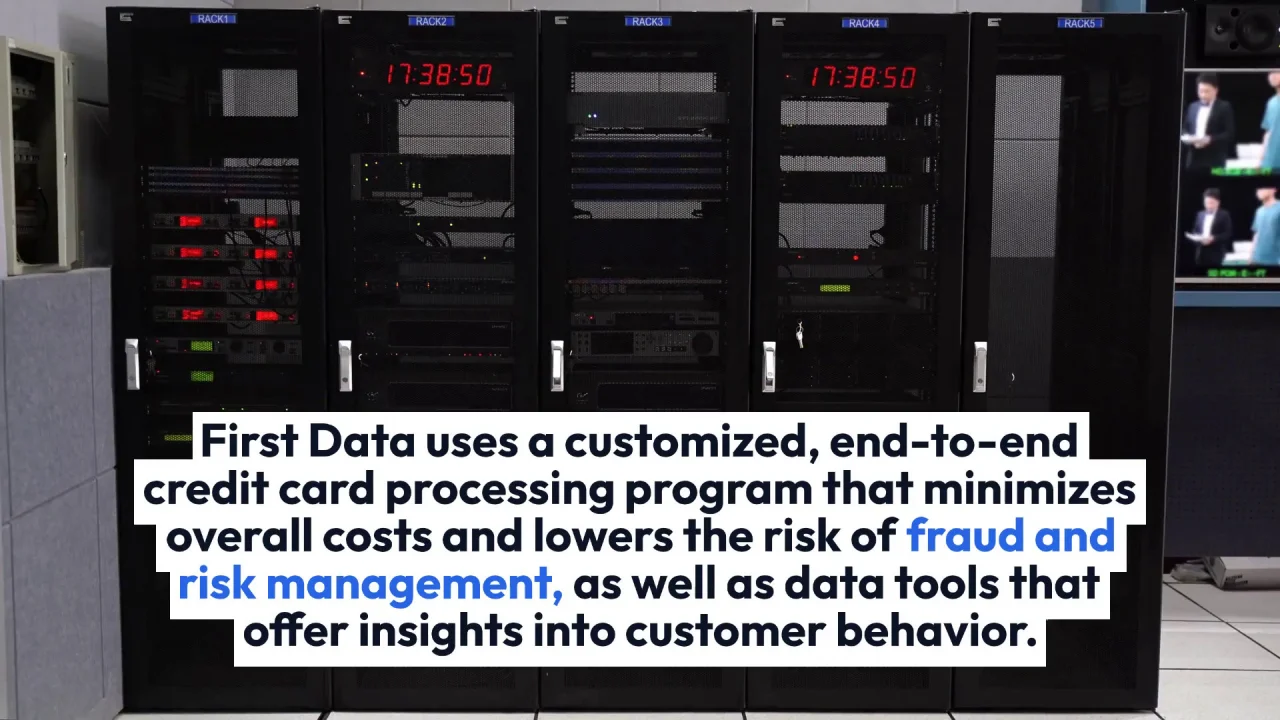

The credit card processor for point-of-sale (POS) systems plays a big role in the success or failure of a business. Fortunately, there are many to choose from to find the right fit for a business.
Take a look at our guide to choosing a credit card processor for POS systems and learn more about the pros and cons of different processors
Credit Card Processing Companies
Though there are many possible credit card processing companies to choose from, the top-rated companies that offer a variety of point of sale solutions are:
Worldpay
Worldpay offers a wide variety of in-store payment technologies, ranging from stand-alone devices to integrated POS solutions. Worldpay is partners with over 800 integrated software vendors and utilizes the latest in EMV chip technology to prevent fraud. A self-service reporting tool and data customization ensure comprehensive insights about customer and business information.
First Data
First Data offers dynamic credit card processing and payment solutions designed to streamline the process for the customer, while also helping with acquisition and retention goals. First Data uses a customized, end-to-end credit card processing program that minimizes overall costs and lowers the risk of fraud and risk management, as well as data tools that offer insights into customer behavior.
TYSYS
TYSYS is a credit card processor that offers payment processing, merchant, and payment services. TYSYS offers solutions for different industries, such as a restaurant or retail POS, as well as different payment methods, security tools, and payment products. It also offers customized pricing based on business size.
Chase Paymentech
Chase Paymentech is a division of Chase for Business that offers a variety of point of sale systems and payment products for businesses, including a countertop POS terminal for brick-and-mortar businesses. Chase Paymentech also offers security and fraud protection, reporting tools, and 24/7 customer service.
What are ISOs/MSP?
When a business owner applies for a merchant account, a credit card processor, ISO, or MSP are parties to the agreement.
Independent Sales Organization (ISO)
ISO is a term that refers to an individual or organization that isn’t a bank but has an established card relationship with member banks.
Member Service Provider (MSP)
A Member Service Provider isn’t a credit card association member but is registered by a major credit card corporation to provide program services.
Neither ISOs nor MSPs can handle a merchant’s funds. This is up to the sponsorship bank, or processing bank, that has an established relationship with the ISO or MSP. Multiple member banks can sponsor the ISO/MSP, however.
Once an ISO/MSP is sponsored by a member bank, they can market different merchant accounts. The member bank must verify that the company is financially stable before marketing on its behalf. Registering with VISA or MasterCard requires strict compliance with marketing regulations and associated fees.
Questions to Ask When Signing Up for Credit Card Processing
Any vendor or supplier hired for a business should be thoroughly researched, and a credit card processor is no different. Asking the right questions can provide valuable insights into a company’s capabilities, experience, and reliability.
Here are examples of questions to ask a credit card processor:
- What are the fees? Be sure that all fees are understood since some companies will tack on unnecessary or hidden fees to make more money.
- What industries are available? If possible, a credit card processing company should have experience with the same industry, whether that’s supply, hotel, and hospitality, retail, restaurant, or storage.
- What credit card processing solutions are available? Many point-of-sale systems may be offered by a credit card processor. The pros and cons of each should be outlined for the business and industry.
- Are the credit card processing solutions EMV-compliant? EMV technology is used to keep consumer credit card data safe from fraud. The EMV liability shift made non-EMV-compliant merchants responsible for in-store card theft, so businesses that don’t have EMV technology are at an increased risk of fraud.
- Is next-day funding available for all card types? Some businesses only have the option of next-day funding with MasterCard, VISA, and Discover.
- Are there any installation fees? Most credit card processing companies don’t charge an installation fee, but since not every business owner knows this, this fee can be added.
- Is online reporting available? Processors that offer online reporting services tend to appreciate transparency.
- What are the different pricing options? Naturally, it’s important to understand the different pricing options, such as flat-rate pricing, tiered pricing, or interchange-plus pricing — and get details about price in writing.
- What other services are available? Credit card processing companies do more than just accept card payments. Many tools offered by credit card processing companies are designed to make business processes quick and easy, such as training services or next-day funding.
What Are the Costs of Credit Card Processing?
Here are some average fees for credit card processing:
- VISA, MasterCard, and Discover have fees of roughly 1.95 percent to 2 percent. For online shops and other similar businesses, the fee is roughly 2.30 percent to 2.50 percent. These costs may vary, however.
- CardFellow charges about 0.20 percent to 0.50 percent less than the above rates.
- American Express is a little more expensive than some other cards, so the acceptance fee is a bit higher.
Contact IT Retail
IT Retail now can offer credit card processing today, so if you are interested in seeing how good your rate is reach out to us and we will provide a free evaluation.






